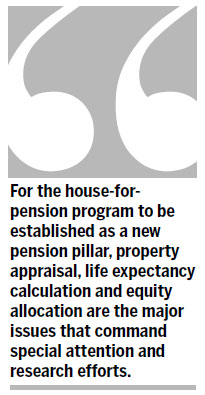Plan to help the elderly
By Zhao Xiao and Xue Xiaoyu (China Daily) Updated: 2013-09-27 07:01The house-for-pension program is designed to free up cash for seniors and enable them to make better use of their housing resources. However, for many seniors, their houses are worth a lifetime of hard work, and it is not easy for them to borrow against their hard-earned equity. Even if they have more than one property they will be more willing to rent them out to get extra income.
There is also a cultural obstacle to reverse mortgages as houses are deemed the best choice of cementing the intergenerational bond. For this reason, many people believe that the program mainly serves the childless, those with deceased children or empty-nesters with children living apart. A lack of understanding about how the program works and how the fixed sum to be paid out every month will be calculated and other procedural issues have also made the elderly wary of reverse mortgages.
The banks have found it hard to boost consumer confidence, and as the house-for-pension business would involve a wide range of intermediary services such as real estate appraisal and legal counseling, efforts would be needed by related service providers to enhance their creditability.

Besides, a government intervention system is needed to tackle any problems that might exist in a reverse mortgage product, and a government guarantee system will be needed to help build trust between the financial institutions and elderly homeowners. Unfortunately, there is still no specific rule in this respect, neither is there any clear supervision over the business.
Moreover, reverse mortgages entail risks for both sides and factors including expectation long-term interest rates and changes in interest-rate policies will directly affect their real earnings. Meanwhile, there is an information asymmetry because compared with financial institutions homeowners are more familiar with the quality of their property. This asymmetry, together with adverse selection and moral hazard problems as well as the volatility of the housing market, increases the risks for financial institutions and add to their doubts about the program.
For these reasons the house-for-pension market will be limited, and it will be difficult for the program to gain traction in the short term. In the long run, it is possible that the program will benefit both the elderly and insurance companies and banks by easing the funds shortage for care for the elderly, revitalizing housing resources and expanding the insurance business.
But for the house-for-pension program to be established as a new pension pillar, property appraisal, life expectancy calculation and equity allocation are the major issues that command special attention and research efforts.
Zhao Xiao is a professor with the school of economics and management, Beijing University of Science and Technology, and Xue Xiaoyu is an economics PhD at the school.
(China Daily 09/27/2013 page8)











